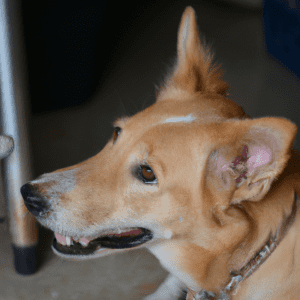Nyquil is a popular over-the-counter remedy for cold and flu symptoms, but can it be safely given to dogs? While Nyquil contains active ingredients that are safe for humans, it can be toxic to dogs. To answer this question, it is important to understand the active ingredients in Nyquil and the potential risks they pose to dogs.
Additionally, there are alternative treatments that may be more suitable for a sick dog. In this article, we’ll discuss whether or not you can give Nyquil to your dog, the risks associated with doing so, and potential alternatives.
Can Nyquil Be Used to Treat a Sick Dog?
No, Nyquil should not be used to treat a sick dog. Nyquil is made for humans and contains ingredients that can be toxic and even fatal to animals if ingested. If your dog is sick, it’s best to take them to the vet for a proper diagnosis and treatment. Your vet can provide you with medications that are safe and effective for your pet.
Does Nyquil Have Any Side Effects on Dogs?
Yes, Nyquil can have some serious side effects on dogs, so it’s important to know what to look out for if you think your pup might have consumed some. Nyquil contains a number of active ingredients that can be very dangerous for dogs, including acetaminophen, dextromethorphan, and alcohol.
Acetaminophen can cause liver damage, stomach ulcers, and even death, so it’s important to seek veterinary help if you think your pup has consumed Nyquil. Dextromethorphan, an antihistamine, can cause lethargy, disorientation, and excessive panting.
Alcohol can cause vomiting, diarrhea, and central nervous system depression, so it’s important to watch for these signs as well. It’s best to keep Nyquil and all other medications away from your pup, but if you think your dog has ingested some, contact your vet right away.
How Can You Tell If Your Dog is Feeling Under the Weather?
If your pup is feeling a bit under the weather, there are a few tell-tale signs you should look out for. Here are some of the most common signs that your pup may not be feeling their best: -Lack of Appetite: One of the first signs that your pup may be feeling under the weather is if they’re not eating as much as they usually do. If your pup is usually a voracious eater, but all of a sudden they seem uninterested in food, it could be a sign that something is up. -Lethargy: If your pup is usually full of energy, but suddenly seems sluggish, it’s a sure sign that something is wrong.
If your pup is sleeping more than usual, and not interested in playing, it’s a good idea to check in with your vet. -Change in Behavior: Dogs are creatures of habit and if your pup is exhibiting any unusual behavior, it could be a sign that something is wrong. If your pup is suddenly growling or snapping at you, or exhibiting any other behavior that’s out of the ordinary for them, it could be a sign that they’re feeling unwell and need to see a vet. -Vomiting or Diarrhea: If your pup is vomiting or has diarrhea, it’s always a good idea to take them to the vet.
This could be a sign of an underlying health issue, or even something as simple as a bad reaction to something they ate. If you notice any of these signs in your pup, it’s always a good idea to check in with your vet to make sure everything is alright.
Is it Safe to Give Nyquil to a Dog Suffering from a Cold or Flu?
No, it is not safe to give Nyquil to a dog suffering from a cold or flu. Nyquil is a human medication and contains ingredients that are toxic to dogs, such as acetaminophen. Ingestion of Nyquil can lead to serious side effects, including liver and kidney damage, loss of appetite, vomiting, and even death in some cases.
If your dog is suffering from a cold or flu, it is best to take him to the vet for treatment. The vet may recommend a specific medication to treat the cold or flu symptoms, or they may recommend providing your dog with extra rest, fluids, and a nutritious diet.
What Are the Best Home Remedies for Caring for a Sick Dog?
When your pup is feeling under the weather, there are some great home remedies that can help provide relief and get them back to feeling like their old selves in no time. Here are a few of the best home remedies for caring for a sick dog:
- Give them plenty of rest. Rest is essential in helping your pup recuperate, so make sure they have plenty of comfortable places to rest and sleep.
- Provide them with a nutritious diet. A balanced diet with plenty of protein and carbohydrates will help them get back to health quickly.
- Try natural supplements for pain and inflammation. There are many natural supplements like turmeric and ginger that can help reduce inflammation and provide pain relief.
- Use warm compresses for pain. Applying warm compresses to your pup’s sore spots can help provide relief from pain and inflammation.
- Offer homemade chicken soup. Homemade chicken soup is a great way to provide extra nutrition and hydration for your pup when they’re not feeling well.
- Give them plenty of love and affection. Sometimes the best medicine for a sick pup is simply providing them with extra cuddles and love. By following these home remedies, you can help your pup get back to its normal routine in no time.
What Kind of Nyquil is Safe for Dogs?
When it comes to Nyquil, it’s generally not a good idea to give it to your pup. Nyquil contains a lot of active ingredients that are not safe for dogs, like acetaminophen, dextromethorphan, and alcohol. That said, there is one Nyquil product that is safe for dogs – Nyquil VapoRub.
Nyquil VapoRub contains only natural, pet-safe ingredients such as eucalyptus and menthol, and it can help soothe your pup’s cold symptoms. Just be sure to read the label carefully and follow the dosage instructions.
How Can I Comfort My Dog if They Are Unwell?
If your pup is feeling unwell, it’s important to give them extra love and care. Here are some tips for comforting your pup when they’re feeling under the weather: – Spend some quality time together. A cuddle session, a belly rub, or a game of fetch can help your pup feel better in no time. –
Give them a massage: Massage can help reduce stress and anxiety, relieving some of the discomforts they may be feeling. – Make sure they stay hydrated: Offer them fresh, clean water throughout the day and make sure they have access to plenty of it. – Stick to their normal routine: If possible, try to keep them on their normal routine.
This can help them feel more secure and in control. – Provide a warm, comfortable spot: Make sure your pup has a cozy spot to relax in. This will help them feel safe and secure. – Offer them their favorite treats: Treats can help lift their spirits and make them feel better. Providing your pup with love and comfort will help them heal faster and feel better.
What Are the Signs of an Ill Dog that Should Prompt Immediate Medical Attention?
If you notice any of the following signs in your pup, it’s time to visit the vet! – Loss of appetite: If your pup suddenly stops eating, this could be a sign of a serious medical condition. – Lethargy: If your dog suddenly becomes sluggish and uninterested in activities they normally enjoy, it could be a sign of illness.
Vomiting or diarrhea: If your pup is vomiting or has diarrhea, it could be a sign of a bacterial or viral infection. – Coughing or sneezing: If your pup is coughing or sneezing more than normal, it could be a sign of a respiratory infection. – Abnormal behavior: If your pup’s behavior suddenly changes, it could be a sign of a medical problem. – Unusual lumps or bumps: If you notice any unusual lumps or bumps on your pup, it’s best to get it checked out by the vet.
Abnormal discharge from the eyes or nose: If you notice any discharge from your pup’s eyes or nose, it could be a sign of infection. – Excessive thirst or urination: If your pup is drinking or urinating more than usual, it could be a sign of diabetes or other health issues.
How Can I Administer Nyquil to My Dog Safely?
It’s best to avoid giving your dog any kind of over-the-counter human medication, such as Nyquil. These medications are not designed for animals, and they can be toxic, even in small doses. If your dog is ill, it’s important to take them to the vet for a proper diagnosis and treatment plan.
That said, if you absolutely must give your dog Nyquil in an emergency situation, here are a few tips to help you do it safely. Determine the correct dosage for your dog by following the instructions on the bottle and consulting your vet.
- Administer the Nyquil in liquid form, not pill form.
- Try to get your dog to take the medication willingly by mixing it in with a bit of wet food or low-sodium broth.
- Monitor your dog closely for any adverse reactions or side effects.
- If your dog is showing signs of distress or discomfort, stop giving them.
Nyquil and contact your vet immediately. It’s important to remember that administering Nyquil to your dog should only be done as a last resort. If your pet is ill, it’s always best to seek professional medical advice and treatment.
What Alternatives to Nyquil Are Available for Treating a Sick Dog?
If your dog is feeling under the weather, there are plenty of alternatives to Nyquil to help them feel better. It is important to remember that most medications that are safe for humans are not necessarily safe for dogs. So, before giving your pup any medication, make sure to consult with your vet first. Here are a few alternatives to Nyquil for treating a sick dog:
- Natural remedies: Depending on the symptoms your dog is experiencing, you may be able to find effective natural remedies. For example, ginger root can help soothe an upset stomach, and licorice root can help boost the immune system.
- Herbal supplements: There are a variety of herbal supplements that may be beneficial for your pup. Many contain ingredients such as alfalfa, echinacea, and astragalus, which can help boost the immune system and fight infection.
- Homeopathic remedies: Homeopathic remedies can be used to treat a variety of ailments in dogs. Popular homeopathic remedies include chamomile, calendula, and yarrow.
- Prescription medications: If the natural and homeopathic remedies don’t seem to be working, your vet may prescribe medications such as antibiotics, anti-inflammatories, or cough suppressants. No matter which treatment option you choose, it is important to make sure that your pup is getting plenty of rest and drinking lots of water. If your pup’s symptoms persist or worsen, contact your vet right away.
In conclusion, it is not recommended to give NyQuil to a dog as it contains ingredients that can be toxic to them. Additionally, the dosage and potency of NyQuil can vary, making it difficult to determine a safe dosage for dogs. If your dog is sick, it is best to speak with your veterinarian and seek their advice on the best course of action for your pet.




